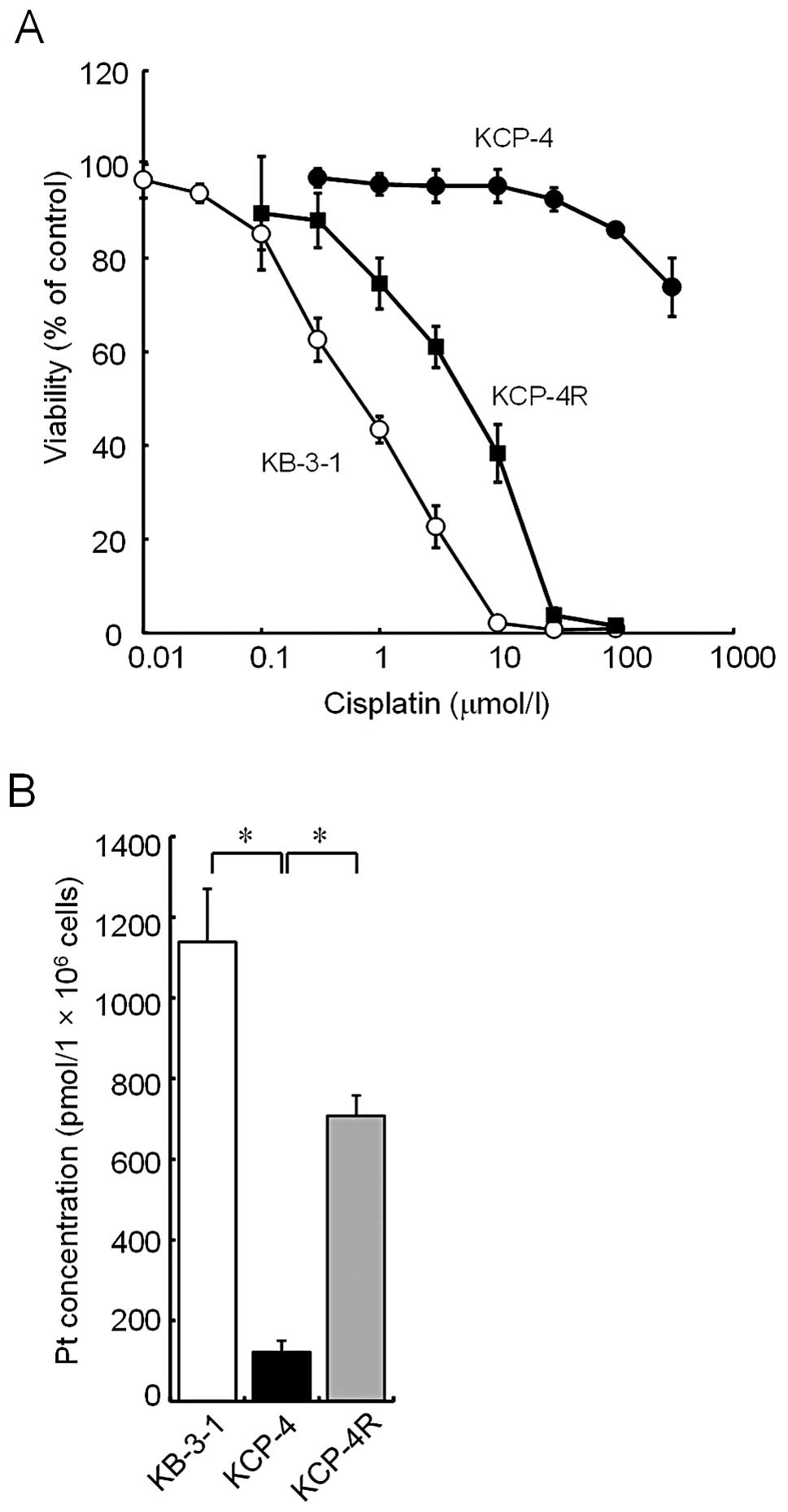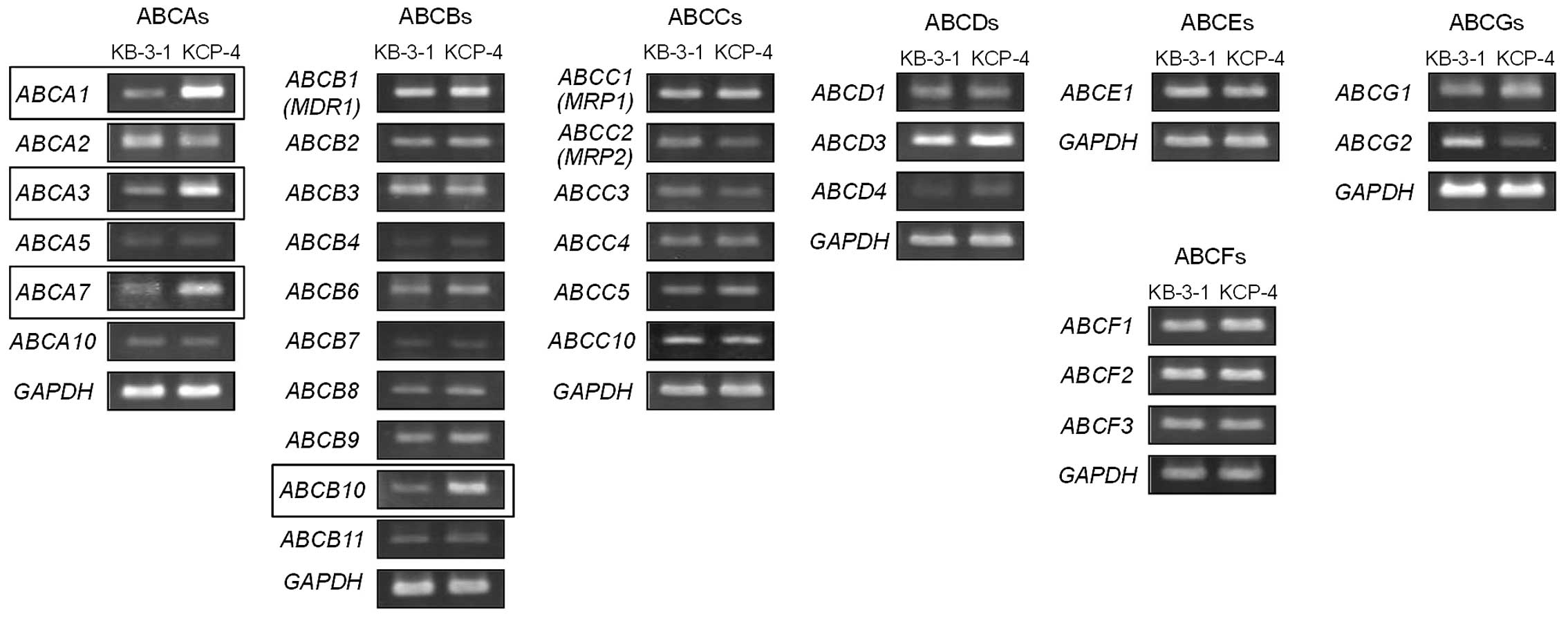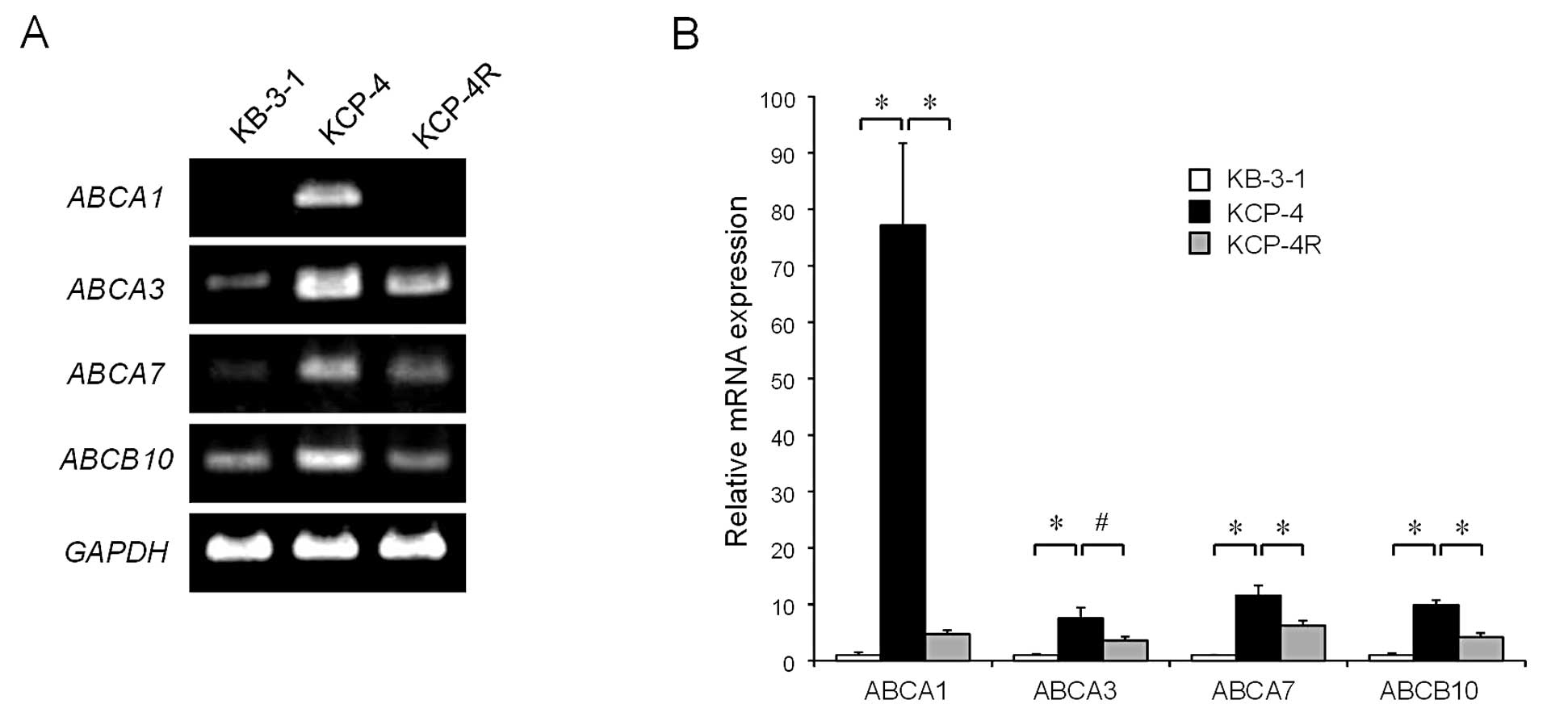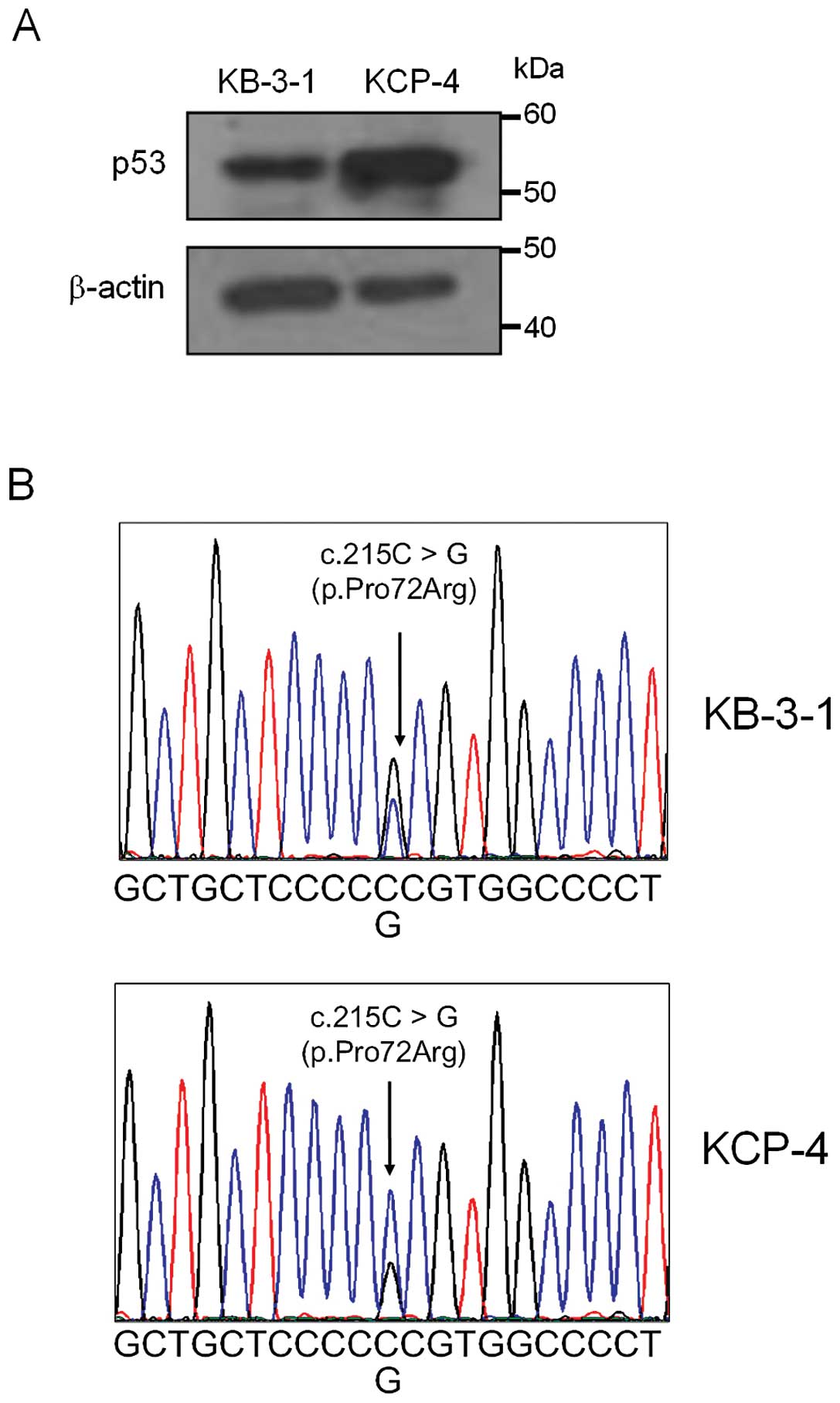|
1
|
Loehrer PJ and Einhorn LH: Drugs five
years later. Cisplatin Ann Intern Med. 100:704–713. 1984.PubMed/NCBI
|
|
2
|
Elit L, Oliver TK, Covens A, et al:
Intraperitoneal chemotherapy in the first-line treatment of women
with stage III epithelial ovarian cancer: a systematic review with
metaanalyses. Cancer. 109:692–702. 2007. View Article : Google Scholar : PubMed/NCBI
|
|
3
|
Sculier JP and Moro-Sibilot D: First- and
second-line therapy for advanced nonsmall cell lung cancer. Eur
Respir J. 33:915–930. 2009. View Article : Google Scholar : PubMed/NCBI
|
|
4
|
Vermorken JB and Specenier P: Optimal
treatment for recurrent/metastatic head and neck cancer. Ann Oncol.
21(Suppl 7): vii252–261. 2010. View Article : Google Scholar : PubMed/NCBI
|
|
5
|
Ismaili N, Amzerin M and Flechon A:
Chemotherapy in advanced bladder cancer: current status and future.
J Hematol Oncol. 4:352011. View Article : Google Scholar : PubMed/NCBI
|
|
6
|
Comess KM, Burstyn JN, Essigmann JM and
Lippard SJ: Replication inhibition and translesion synthesis on
templates containing site-specifically placed
cis-diamminedichloroplatinum(II) DNA adducts. Biochemistry.
31:3975–3990. 1992. View Article : Google Scholar : PubMed/NCBI
|
|
7
|
Suo Z, Lippard SJ and Johnson KA: Single
d(GpG)/cis-diammineplatinum(II) adduct-induced inhibition of DNA
polymerization. Biochemistry. 38:715–726. 1999. View Article : Google Scholar : PubMed/NCBI
|
|
8
|
Wang G, Reed E and Li QQ: Molecular basis
of cellular response to cisplatin chemotherapy in non-small cell
lung cancer (Review). Oncol Rep. 12:955–965. 2004.PubMed/NCBI
|
|
9
|
Siddik ZH: Cisplatin: mode of cytotoxic
action and molecular basis of resistance. Oncogene. 22:7265–7279.
2003. View Article : Google Scholar : PubMed/NCBI
|
|
10
|
Kelland LR: New platinum antitumor
complexes. Crit Rev Oncol Hematol. 15:191–219. 1993. View Article : Google Scholar : PubMed/NCBI
|
|
11
|
Timmer-Bosscha H, Mulder NH and de Vries
EG: Modulation of cis-diamminedichloroplatinum(II) resistance: a
review. Br J Cancer. 66:227–238. 1992. View Article : Google Scholar : PubMed/NCBI
|
|
12
|
Borst P, Rottenberg S and Jonkers J: How
do real tumors become resistant to cisplatin? Cell Cycle.
7:1353–1359. 2008. View Article : Google Scholar : PubMed/NCBI
|
|
13
|
Torigoe T, Izumi H, Ishiguchi H, et al:
Cisplatin resistance and transcription factors. Curr Med Chem
Anticancer Agents. 5:15–27. 2005. View Article : Google Scholar : PubMed/NCBI
|
|
14
|
Stewart DJ: Mechanisms of resistance to
cisplatin and carboplatin. Crit Rev Oncol Hematol. 63:12–31. 2007.
View Article : Google Scholar : PubMed/NCBI
|
|
15
|
Safaei R and Howell SB: Copper
transporters regulate the cellular pharmacology and sensitivity to
Pt drugs. Crit Rev Oncol Hematol. 53:13–23. 2005. View Article : Google Scholar : PubMed/NCBI
|
|
16
|
Ishida S, Lee J, Thiele DJ and Herskowitz
I: Uptake of the anticancer drug cisplatin mediated by the copper
transporter Ctr1 in yeast and mammals. Proc Natl Acad Sci USA.
99:14298–14302. 2002. View Article : Google Scholar : PubMed/NCBI
|
|
17
|
Miyashita H, Nitta Y, Mori S, et al:
Expression of copper-transporting P-type adenosine triphosphatase
(ATP7B) as a chemoresistance marker in human oral squamous cell
carcinoma treated with cisplatin. Oral Oncol. 39:157–162. 2003.
View Article : Google Scholar : PubMed/NCBI
|
|
18
|
Samimi G, Safaei R, Katano K, et al:
Increased expression of the copper efflux transporter ATP7A
mediates resistance to cisplatin, carboplatin, and oxaliplatin in
ovarian cancer cells. Clin Cancer Res. 10:4661–4669. 2004.
View Article : Google Scholar : PubMed/NCBI
|
|
19
|
Surowiak P, Materna V, Kaplenko I, et al:
ABCC2 (MRP2, cMOAT) can be localized in the nuclear membrane of
ovarian carcinomas and correlates with resistance to cisplatin and
clinical outcome. Clin Cancer Res. 12:7149–7158. 2006. View Article : Google Scholar : PubMed/NCBI
|
|
20
|
Taniguchi K, Wada M, Kohno K, et al: A
human canalicular multispecific organic anion transporter (cMOAT)
gene is overexpressed in cisplatin-resistant human cancer cell
lines with decreased drug accumulation. Cancer Res. 56:4124–4129.
1996.
|
|
21
|
Fujii R, Mutoh M, Sumizawa T, Chen ZS,
Yoshimura A and Akiyama S: Adenosine triphosphate-dependent
transport of leukotriene C4 by membrane vesicles
prepared from cisplatin-resistant human epidermoid carcinoma tumor
cells. J Natl Cancer Inst. 86:1781–1784. 1994.PubMed/NCBI
|
|
22
|
Fujii R, Mutoh M, Niwa K, Yamada K, Aikou
T, Nakagawa M, Kuwano M and Akiyama S: Active efflux system for
cisplatin in cisplatin-resistant human KB cells. Jpn J Cancer Res.
85:426–433. 1994. View Article : Google Scholar : PubMed/NCBI
|
|
23
|
Oiso S, Ikeda R, Nakamura K, Takeda Y,
Akiyama S and Kariyazono H: Involvement of NF-κB activation in the
cisplatin resistance of human epidermoid carcinoma KCP-4 cells.
Oncol Rep. 28:27–32. 2012.
|
|
24
|
Chen ZS, Mutoh M, Sumizawa T, et al: An
active efflux system for heavy metals in cisplatin-resistant human
KB carcinoma cells. Exp Cell Res. 240:312–320. 1998. View Article : Google Scholar : PubMed/NCBI
|
|
25
|
Chuman Y, Chen ZS, Sumizawa T, et al:
Characterization of the ATP-dependent LTC4 transporter
in cisplatin-resistant human KB cells. Biochem Biophys Res Commun.
226:158–165. 1996. View Article : Google Scholar : PubMed/NCBI
|
|
26
|
Velculescu VE and El-Deiry WS: Biological
and clinical importance of the p53 tumor-suppressor gene.
Clin Chem. 42:858–868. 1996.PubMed/NCBI
|
|
27
|
El-Deiry WS: The role of p53 in
chemosensitivity and radiosensitivity. Oncogene. 22:7486–7495.
2003. View Article : Google Scholar : PubMed/NCBI
|
|
28
|
Hussain SP and Harris CC: Molecular
epidemiology of human cancer: contribution of mutation spectra
studies of tumor suppressor genes. Cancer Res. 58:4023–4037.
1998.
|
|
29
|
Akiyama S, Fojo A, Hanover JA, Pastan I
and Gottesman MM: Isolation and genetic characterization of human
KB cell lines resistant to multiple drugs. Somat Cell Mol Genet.
11:117–126. 1985. View Article : Google Scholar : PubMed/NCBI
|
|
30
|
Tanaka AR, Abe-Dohmae S, Ohnishi T, et al:
Effects of mutations of ABCA1 in the first extracellular domain on
subcellular trafficking and ATP binding/hydrolysis. J Biol Chem.
278:8815–8819. 2003. View Article : Google Scholar : PubMed/NCBI
|
|
31
|
Nagao K, Takahashi K, Hanada K, Kioka N,
Matsuo M and Ueda K: Enhanced apoA–I-dependent cholesterol efflux
by ABCA1 from sphingomyelin-deficient Chinese hamster ovary cells.
J Biol Chem. 282:14868–14874. 2007.
|
|
32
|
Iwasaki H, Okabe T, Takara K, Yoshida Y,
Hanashiro K and Oku H: Down-regulation of lipids transporter ABCA1
increases the cytotoxicity of nitidine. Cancer Chemother Pharmacol.
66:953–959. 2010. View Article : Google Scholar : PubMed/NCBI
|
|
33
|
Bachmeier BE, Iancu CM, Killian PH, et al:
Overexpression of the ATP binding cassette gene ABCA1 determines
resistance to Curcumin in M14 melanoma cells. Mol Cancer.
8:1292009. View Article : Google Scholar : PubMed/NCBI
|
|
34
|
Lee BH, Taylor MG, Robinet P, et al:
Dysregulation of cholesterol homeostasis in human prostate cancer
through loss of ABCA1. Cancer Res. 73:1211–1218. 2013.
View Article : Google Scholar : PubMed/NCBI
|
|
35
|
Sekine Y, Demosky SJ, Stonik JA, et al:
High-density lipoprotein induces proliferation and migration of
human prostate androgen-independent cancer cells by an
ABCA1-dependent mechanism. Mol Cancer Res. 8:1284–1294. 2010.
View Article : Google Scholar
|
|
36
|
Matsumura Y, Sakai H, Sasaki M, Ban N and
Inagaki N: ABCA3-mediated choline-phospholipids uptake into
intracellular vesicles in A549 cells. FEBS Lett. 581:3139–3144.
2007. View Article : Google Scholar : PubMed/NCBI
|
|
37
|
Matsumura Y, Ban N, Ueda K and Inagaki N:
Characterization and classification of ATP-binding cassette
transporter ABCA3 mutants in fatal surfactant deficiency. J Biol
Chem. 281:34503–34514. 2006. View Article : Google Scholar : PubMed/NCBI
|
|
38
|
Chapuy B, Koch R, Radunski U, et al:
Intracellular ABC transporter A3 confers multidrug resistance in
leukemia cells by lysosomal drug sequestration. Leukemia.
22:1576–1586. 2008. View Article : Google Scholar : PubMed/NCBI
|
|
39
|
Chapuy B, Panse M, Radunski U, et al: ABC
transporter A3 facilitates lysosomal sequestration of imatinib and
modulates susceptibility of chronic myeloid leukemia cell lines to
this drug. Haematologica. 94:1528–1536. 2009. View Article : Google Scholar : PubMed/NCBI
|
|
40
|
Iwamoto N, Abe-Dohmae S, Sato R and
Yokoyama S: ABCA7 expression is regulated by cellular cholesterol
through the SREBP2 pathway and associated with phagocytosis. J
Lipid Res. 47:1915–1927. 2006. View Article : Google Scholar : PubMed/NCBI
|
|
41
|
Karch CM, Jeng AT, Nowotny P, Cady J,
Cruchaga C and Goate AM: Expression of novel Alzheimer's disease
risk genes in control and Alzheimer's disease brains. PLoS One.
7:e509762012.
|
|
42
|
Kim WS, Li H, Ruberu K, et al: Deletion of
Abca7 increases cerebral amyloid-β accumulation in the J20
mouse model of Alzheimer's disease. J Neurosci. 33:4387–4394.
2013.PubMed/NCBI
|
|
43
|
Graf SA, Haigh SE, Corson ED and Shirihai
OS: Targeting, import, and dimerization of a mammalian
mitochondrial ATP binding cassette (ABC) transporter, ABCB10
(ABC-me). J Biol Chem. 279:42954–42963. 2004. View Article : Google Scholar : PubMed/NCBI
|
|
44
|
Shirihai OS, Gregory T, Yu C, Orkin SH and
Weiss MJ: ABC-me: a novel mitochondrial transporter induced by
GATA-1 during erythroid differentiation. EMBO J. 19:2492–2502.
2000. View Article : Google Scholar : PubMed/NCBI
|
|
45
|
Chen W, Dailey HA and Paw BH:
Ferrochelatase forms an oligomeric complex with mitoferrin-1 and
Abcb10 for erythroid heme biosynthesis. Blood. 116:628–630. 2010.
View Article : Google Scholar : PubMed/NCBI
|
|
46
|
Chen W, Paradkar PN, Li L, et al: Abcb10
physically interacts with mitoferrin-1 (Slc25a37) to enhance its
stability and function in the erythroid mitochondria. Proc Natl
Acad Sci USA. 106:16263–16268. 2009. View Article : Google Scholar : PubMed/NCBI
|
|
47
|
Ishikawa T, Li ZS, Lu YP and Rea PA: The
GS-X pump in plant, yeast, and animal cells: structure, function,
and gene expression. Biosci Rep. 17:189–207. 1997. View Article : Google Scholar : PubMed/NCBI
|
|
48
|
Bergamaschi D, Gasco M, Hiller L, et al:
p53 polymorphism influences response in cancer chemotherapy via
modulation of p73-dependent apoptosis. Cancer Cell. 3:387–402.
2003. View Article : Google Scholar : PubMed/NCBI
|


















